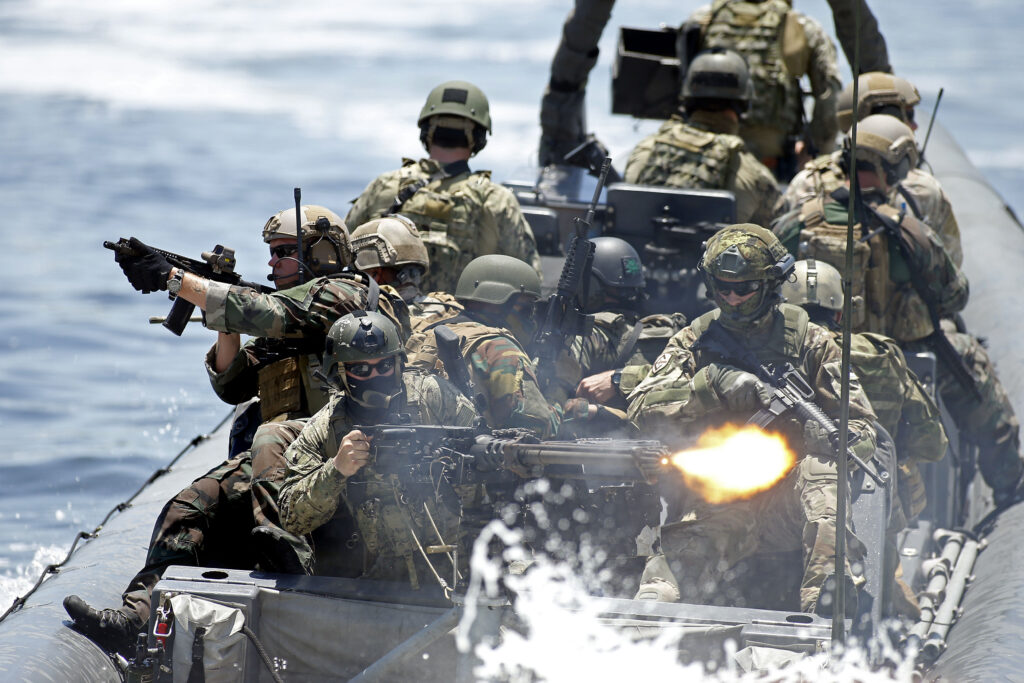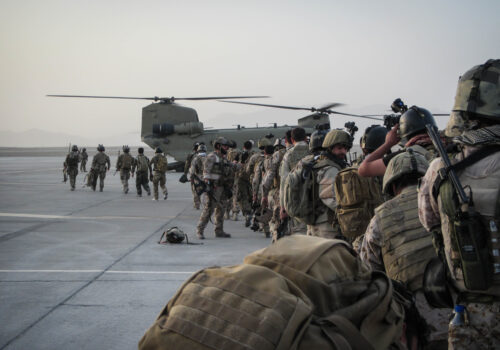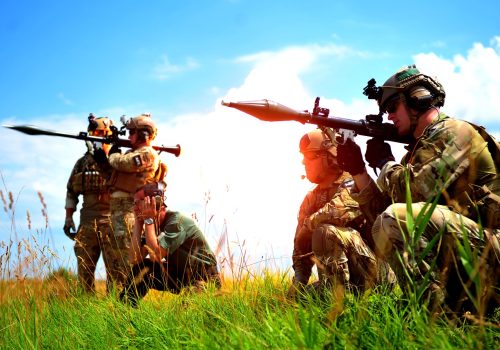After 9/11, US special operations forces (USSOF) became well known for direct-action missions that captivated the public’s imagination and demonstrated unparalleled tactical success. The highly publicized raids, precision strikes, and elimination of terrorist threats solidified USSOF’s reputation as the tip of the spear in the US military’s arsenal.
In recent years, however, the global security environment has changed. Adversaries such as Russia and China are using a broad spectrum of diplomatic, informational, military, and economic tactics to challenge the US-led order and achieve their global aims. This return of strategic competition has drawn attention away from the surgical, direct-action operations so prominent during the height of the war on terror, and toward confronting the sophisticated strategies of near-peer adversaries.
So what does this mean for special operations forces?
USSOF will continue to have a central role in the era of renewed strategic competition—but only if there is a broader appreciation and application of USSOF’s capabilities, which extend far beyond just raids and precision strikes. Too often at present, however, USSOF’s distinct capabilities and expertise are overlooked or misunderstood among the broader national security community.
Some of these operations will require applying the operational tactics USSOF focused on since 9/11 to new challenges.
In the face of an evolving and increasingly complex global threat environment, USSOF represents a uniquely versatile component of the US Joint Force. It possesses an array of capabilities that, if fully leveraged, could significantly enhance US force posture. To do so, USSOF must shift its mindset and planning toward strategic competition. There must also be a concerted effort from the services and the Joint Force to integrate USSOF’s unique capabilities more effectively, and the broader defense community must take steps to make the most of the multifaceted value that USSOF brings to the table.
To begin with, USSOF must extend its reach into non-kinetic operations and expand its irregular warfare approach to address the advanced strategies of adversaries such as China and Russia. Some of these operations will require applying the operational tactics USSOF focused on since 9/11 to new challenges. For example, USSOF’s well-honed capabilities for navigating denied and niche environments, including underground operations—an important asset in past counterterrorism missions—are now vital for filling strategic gaps in unconventional warfare scenarios. The salience of this capability is evident, for example, if an adversary uses complex tunnel networks, and it represents just one aspect of USSOF’s highly specialized tactics, techniques, and procedures that can be transitioned to new strategic roles.
This transition will also require adapting USSOF’s strength in new ways. Some of this is already underway—for example, modernizations in naval capabilities are set to boost USSOF’s undersea warfare proficiency, which will help counter rivals such as China in contested spaces. USSOF should continue to prepare for the challenges posed by strategic competition by enhancing its cyber and space capabilities, investing in emerging fields such as artificial intelligence, and bolstering civil-affairs expertise for functioning in extreme and complex operating environments. Clear and decisive communication between the US assistant secretary of defense for special operations and low-intensity conflict and the United States Special Operations Command is vital to define the strategic contributions of special operations within the Department of Defense.
Yet embracing these changes also presents challenges, particularly for USSOF to define and measure its own success. The often-preventive nature of USSOF’s missions, which are aimed at deterring adversaries and shaping their behavior, requires a nuanced approach to evaluating effectiveness. Establishing clear objectives and metrics for strategic competition will be essential, enabling USSOF to quantify its successes and adapt its strategies accordingly.
At the same time, USSOF must maintain its proficiency in essential ongoing tasks, such as combating violent extremist organizations, countering terrorism, and managing weapons of mass destruction. Doing so is necessary so that the United States avoids strategic distractions, such as a preventable terrorist attack.
USSOF works extensively in the information domain, pushing back against propaganda and disinformation from adversaries.
As USSOF adapts its mindset and planning to meet the challenges posed by strategic competition, the Joint Force and the broader interagency must find ways to understand and maximize USSOF’s capabilities. To do so, decision makers across the Joint Force must properly recognize the full range of USSOF’s potential roles, particularly before conflict breaks out.
Unfortunately, some of these potential roles are under-resourced and underleveraged. For example, USSOF’s civil affairs and psychological operations capabilities, though currently underutilized, are essential for strategic competition. The sole brigade responsible for civil affairs is tasked with everything from economic analysis to liaising with civilian government agencies on the ground. With sufficient resources, it could expand its civil-military cooperation in volatile areas, support local governance, and respond to increasingly frequent natural disasters. Notably, United States Marine Forces Special Operations Command’s linguistic and cultural expertise, as demonstrated in long-term operations in the Philippines, highlights the value of investing more in these capacities, especially in strategic areas such as the Indo-Pacific.
Other roles for USSOF are better funded but are still underappreciated across the Department of Defense. USSOF works extensively in the information domain, pushing back against propaganda and disinformation from adversaries. According to General Richard Clarke, former commander of US Special Operations Command, commanders he visited on deployment spent about 60 percent of their time working in the information space. Such work will likely continue, since Russia and China show a growing interest in using information warfare to try to counter US strategic objectives worldwide. Despite this, unfilled billets in the Army’s Special Operations military information support operations were recently cut. This decision signals a troubling undervaluation of these vital capabilities.
If the potential capabilities that USSOF brings to strategic competition are better understood, then these capabilities are more likely to be supported, developed, and implemented in ways that will help shape the strategic environment effectively. Moreover, the capabilities will need to be integrated into a cohesive strategy across the Joint Force, coordinating USSOF’s presence within all seven geographic combatant commands and interagency partners. Doing so would allow USSOF’s capabilities to bridge the divides between different combatant command zones, which could improve the overall US strategic posture in competitive regions and facilitate improved intelligence sharing.
By enhancing USSOF’s capabilities and recognizing its value in strategic competition, the interagency and Department of Defense can ensure it effectively continues to protect US interests and contribute to global stability. Thus equipped, USSOF will remain adept at confronting modern conflict dynamics and asserting US international strategic priorities.
Alyxandra Marine is an assistant director with the Forward Defense program at the Atlantic Council. The recommendations from this piece are explained in further detailed in Stealth, speed, and adaptability: The role of special operations forces in strategic competition.
Further reading
Thu, Mar 7, 2024
Stealth, speed, and adaptability: The role of special operations forces in strategic competition
Report By
Clementine G. Starling and Alyxandra Marine discuss how special operations forces enhance US readiness in an era of strategic competition.
Fri, Oct 13, 2023
Where do US Army special operations fit in a world of strategic competition?
Issue Brief By
General Richard Angle, Leo Blanken, and Lieutenant Colonel Philip Swintek argue that building and maintaining relationships is the true competitive advantage of Army Special Forces (ARSOF).
Wed, Dec 22, 2021
Seizing the advantage: A vision for the next US national defense strategy
Report By Clementine G. Starling, Tyson Wetzel, Christian Trotti
In this latest installment of the Atlantic Council Strategy Papers series, Forward Defense’s Clementine Starling, Lt Col Tyson Wetzel, and Christian Trotti articulate their vision and recommendations for the next US National Defense Strategy, including clearer prioritization, investments and divestments, reposturing of US forces, a new warfighting concept, and a focus on transnational threats like hybrid warfare and climate change.
Image: Operators from 17 countries participate in an International Special Operations Exercise at SOFIC, the Special Operations Forces Industry Conference, in Tampa, Florida, May 21, 2014. SOFIC provides a forum for domestic and foreign military personnel, governments and industry professionals to network and discuss challenges related Special Operations Forces around the globe. REUTERS/Brian Blanco .



